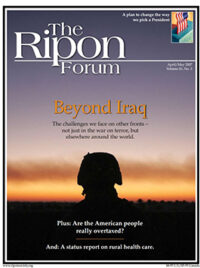
While the grinding Iraq war currently dominates the attention of the American public and government, China’s steady rise in economic and political influence is the single event that will reshape international politics in the 21st century. Sooner or later, American officials will turn their attention to confronting this issue. There are two key points to keep in mind.
First, China’s rising influence is natural. It is a country of 1.3 billion people. Until 1800, it comprised a third of world economic output. China’s rapid growth over the last 30 years reflects a return toward this long-term historical equilibrium. China’s development, as well as that of the rest of Asia, will necessarily alter the preeminent geopolitical position that the United States has enjoyed since the end of the Cold War, and that Western nations have enjoyed since the 19th century. The operational question is not whether we like it or not. It is how we adapt.
Second, China’s leaders are not seeking a worldwide confrontation with the United States. Their key priorities are domestic. The single issue that keeps them up late at night is the fear that the growing discontent of rural farmers and migrants could metastasize into a revolutionary force that topples them from power. All of the formidable energies of the Chinese party-state – the tough police controls, the focus on rapid economic development, and the new emphasis on addressing the needs of the rural poor – are directed at warding off such an event.
China’s development, as well as that of the rest of Asia, will necessarily alter the preeminent geopolitical position that the United States has enjoyed since the end of the Cold War…
This is not to ignore the existence of real and important conflicts between the United States and China. Tensions over Taiwan remain. Chinese officials continue to violate their own laws and treaty commitments granting citizens religious liberty and free speech, generating recriminations on the part of the American government and public. But China today, unlike the Soviet Union of the 1950s, is not seeking to challenge the very foundations of the international political and economic order that have been established since World War II.
So what does this mean for U.S. policy toward China?
First, we need to view China not as a threat, but as a challenge. We should address Chinese competition, not through economic protectionism, but rather through sustained investment in the education of America’s children. We should address increased Chinese political influence, not through bellicose unilateralism or timid isolationism, but rather through expanding existing institutions to give Chinese authorities a role in shaping the international order, and bear corresponding responsibilities in handling international crises such as North Korea and Sudan.
We should also directly address Chinese violations of human rights standards and denials of political liberties, not through willful ignorance or high-pitched denunciations, but through careful and consistent emphasis on the extent to which they fuel the social unrest Chinese officials so desperately wish to avoid. The ability of the United States to remake any country in a democratic mold by compulsion is limited, if not nonexistent. These efforts often result in a nationalist backlash and rejection of the very democratic principles which the United States espouses, particularly when American officials themselves are forced to compromise these principles for the sake of their geopolitical interests. But the concepts of rule of law and representative government continue to hold appeal for many in China, particularly those who appreciate the extent to which many of China’s internal troubles are rooted in a fossilized political system that has failed to keep pace with the rapid economic and social changes of the past three decades. We should support calls for positive reform, and in particular emphasize that citizen experimentation with these concepts does not represent American efforts to impose a foreign ideology, but rather an ongoing search by Chinese citizens themselves for means to resolve the core problems of governance, social unrest, and violations of citizen rights that confront China.
We should address increased Chinese political influence, not through bellicose unilateralism or timid isolationism, but rather through expanding existing institution to give Chinese authorities a role in shaping the international order…
Second, the United States must reaffirm its commitment to international norms and multilateral institutions as a means to protect our interests. American officials do not want to see China’s growing economic and political muscle funneled into creating free-trade zones and political alliances that exclude the United States. Out of simple national self-interest, American officials should seek a China that is firmly anchored in multilateral institutions and processes. But realizing that goal requires American officials to make serious commitments to strengthening these institutions now. If American authorities undermine our commitments under international human rights or WTO treaties now in favor of short-term political gain, we limit our own ability to invoke them in our defense in the future, when our relative influence may be weaker, and our need to resort to them greater.
Third, we must deal with China in a bipartisan manner. American politicians, both Democrats and Republicans, have all too often viewed China as a means to score political points with narrow domestic constituencies, instead of trying to work together across the aisle to formulate a broader strategic vision. One can do that with small nations. One can not with a country that represents a fifth of humanity.
Carl Minzner is an International Affairs Fellow at the Council of Foreign Relations. He previously served as Senior Counsel for the Congressional-Executive Commission on China.




